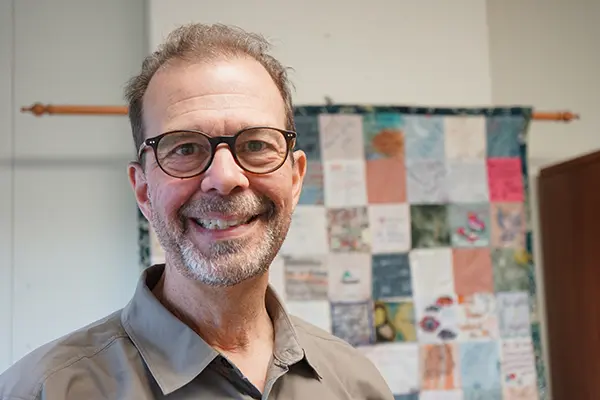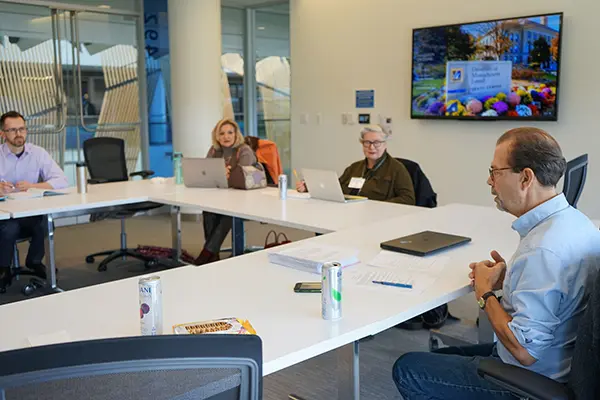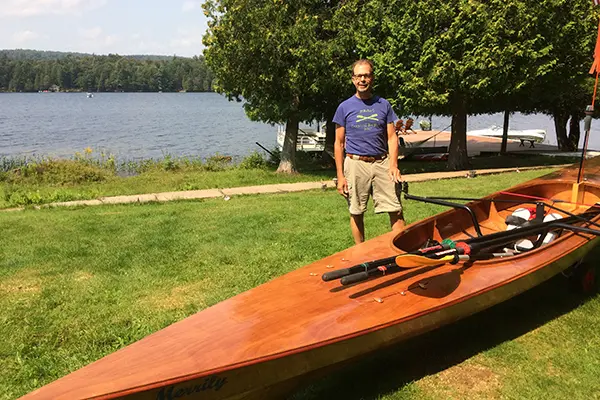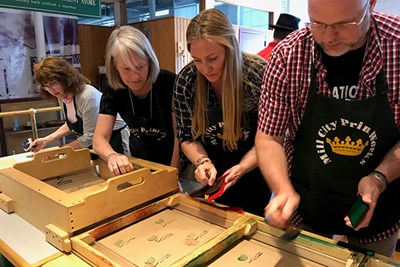Assoc. Prof. Jim Nehring Inspires with Love of Teaching the Teachers
 Image by K. Webster
Image by K. Webster
07/16/2019
By Katharine Webster
What does great teaching look like?
That’s the question Assoc. Prof. Jim Nehring has been asking for three decades, since he started out as a middle school teacher in Pine Bush, N.Y.
He asked it in different ways as he helped start an alternative high school, became principal of a public charter school and earned his doctorate in education.
He kept asking it as he wrote the first of seven books and joined UML’s College of Education. He has asked it while doing research in high-needs school districts in the United States and as a Fulbright Fellow in Northern Ireland.
Now he has at least one answer. And he didn’t need to look any further than his mirror.
This year, Nehring was awarded the Manning Prize for Teaching Excellence alongside four other UMass professors, one at each of the system’s five campuses. The award was established in 2016 by alumni Robert ’84 and Donna Manning ’85, ’91 to recognize leaders in teaching and service.
“There are so many outstanding instructors on this campus, I didn’t think I’d get the nod,” Nehring says.
He did, though, and one reason is that Nehring has helped improve teaching across the UML campus, in part by overseeing course redesign workshops that teach faculty across the university how to better engage their students.
 Image by K. Webster
Image by K. Webster
“There’s a real hunger for this kind of work. People want to take their teaching to the next level,” he says.
This spring, Nehring was elected faculty chair in the College of Education. He’s also just out with another book, co-authored with his UML colleague, Assoc. Prof. Stacy Szczesiul, as well as an associate professor at Salem State University, Megin Charner-Laird.
“Bridging the Progressive-Traditional Divide in Education Reform” summarizes the lessons learned through the authors’ research into highly effective teachers working in high-needs public schools in the U.S. and Northern Ireland. Again, they asked: What does great teaching look like, and what can schools and education systems do to support it?
The answer is that “teaching to the test” encourages shallow thinking and rote memorization, while deeper, more permanent learning comes through combining two educational traditions – academic and progressive – that are often seen as opposed, but are actually very complementary.
Nehring explains: “For the academic tradition, think of the best course you ever took that increased your knowledge and understanding of literature, math, history or science. For the progressive tradition, think of the best project-based, experiential learning you’ve done.
“In the best classrooms, teachers keep the student at the center of instruction by using inquiry-based methods, but still teach a strong academic curriculum.” -Jim Nehring
“In the best classrooms, teachers keep the student at the center of instruction by using inquiry-based methods, but still teach a strong academic curriculum,” he says. “You can teach the fundamentals of a discipline and high-level thinking skills together – and if you’re going to teach any subject well, you have to do that.”
Nehring’s frustration with teaching to the test is what inspired him and a group of like-minded teachers in Bethlehem, N.Y., to start an alternative program, the Lab School, within Bethlehem Central High School. The Lab School took a project-based, interdisciplinary approach to teaching and learning.
While refining his teaching methods at the Lab School, Nehring visited the new Francis Parker Charter Essential School in Devens, Mass., which was engaged in a similar experiment – and was quickly invited to serve as its principal. He accepted, but after two years, he stepped down to be a teacher at the same school because he missed being in the classroom. At the same time, he helped support other teachers.
His first book, “Why Do We Gotta Do This Stuff, Mr. Nehring? Notes from a Teacher’s Day in School,” was published to critical acclaim in 1989, followed by a sequel, “The Schools We Have, The Schools We Want: An American Teacher on the Front Line,” in 1992 and five more books on education reform and alternative methods of teaching.
 Image by James Nehring
Image by James Nehring
Later, Nehring returned to school himself at UMass Amherst, where he earned his Doctor of Education degree (Ed.D.) in 2003. He was hired to join the education faculty at UML in 2006.
Now he applies his inquiry-based, student-centered approach to teaching adults, including school principals, superintendents and curriculum experts in the College of Education’s Ed.D. program. He also teaches in the Ph.D. program, which he coordinates, as well as instructing master’s and undergraduate students.
“It’s super-exciting work,” he says. “I love designing experiences for students and then watching as they become deeply engaged by what they’re learning.”
In his spare time, Nehring raises money for student scholarships. Eight years ago he completed a cross-country bike ride that raised more than $30,000. Two winters back, he built a boat in his garage that he hopes to row in stages from New York City to Charleston, S.C., to raise money for another endowed scholarship.
As the new faculty chair, Nehring looks forward to doing even more to help improve education for everyone.
“Public education is a powerful lever for equity and social justice,” Nehring says. “If we can support values of democracy and pluralism in our public schools, then we have a chance of realizing the best vision of what America can be.”




